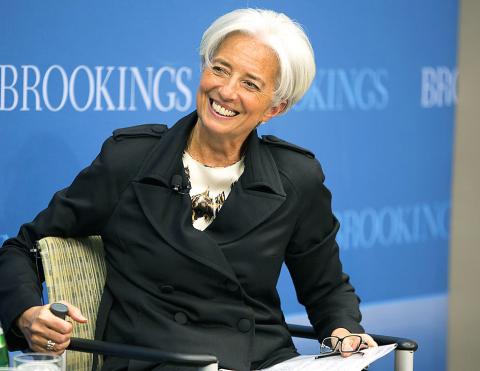IMF Managing Director Christine Lagarde has praised Europe’s efforts to tackle its sovereign-debt crisis and said the “breathing space” should be used to complete the repair work on the global economy.
Speaking ahead of next week’s spring meetings of the IMF and the World Bank, Lagarde said the policy moves taken in Europe had helped ease the strain and meant the IMF no longer needed quite so big a war chest to deal with the problems left behind by the financial crisis and recession.
“The steps taken by the Europeans in recent months are a timely reminder of the power of policy resolve and action,” Lagarde said in a speech at the Brookings Institution in Washington.

Photo: Bloomberg
She urged European policymakers to “keep up and build on” their efforts, including through action in individual countries, support from the European Central Bank [ECB], repairing the banking system and fiscal integration.”
“The much-expected decision of euro area ministers to strengthen the European financial firewall has also been crucial,” she said.
Lagarde’s comments came as Italy was forced to pay sharply higher interest rates when it auctioned 5 billion euros (US$6.59 billion) worth of bonds on Thursday, underlining anxiety in financial markets about the health of the eurozone’s crisis-hit economies.
The Italian government, which is pushing through a series of unpopular economic reformsh, raised 4.88 billion euros from investors, but was forced to pay an average yield of 3.92 percent for three-year loans, far higher than the previous auction last month.
Markets were rattled by the tricky sale, although bond yields fell in afternoon trading, amid rumors that the ECB might have resumed its emergency purchases of Spanish and Italian bonds in a bid to prevent borrowing costs reaching unsustainable levels.
With Spain still in the markets’ sights too, Spanish Prime Minister Mariano Rajoy repeated his insistence that his country would not need financial aid.
“Nobody is considering a bailout, it is on nobody’s agenda,” he told a press conference in Poland, where he was on an official visit.
He also said he had spoken with Italian Prime Minister Mario Monti, who had denied blaming Spain’s travails for rocketing Italian bond yields. Meanwhile, unemployment in Greece rose to 21.8 percent, up from 12.5 percent two years ago.
Soros Fund Management chairman George Soros said that Europe’s “deflationary debt trap threatens to destroy a still incomplete political union.”
In an article in the Financial Times, Soros said the euro had entered a “more lethal phase” and outlined a series of measures to solve the crisis — including an idea that all countries should be able to refinance their debt at the same interest rate.

In Italy’s storied gold-making hubs, jewelers are reworking their designs to trim gold content as they race to blunt the effect of record prices and appeal to shoppers watching their budgets. Gold prices hit a record high on Thursday, surging near US$5,600 an ounce, more than double a year ago as geopolitical concerns and jitters over trade pushed investors toward the safe-haven asset. The rally is putting undue pressure on small artisans as they face mounting demands from customers, including international brands, to produce cheaper items, from signature pieces to wedding rings, according to interviews with four independent jewelers in Italy’s main

Japanese Prime Minister Sanae Takaichi has talked up the benefits of a weaker yen in a campaign speech, adopting a tone at odds with her finance ministry, which has refused to rule out any options to counter excessive foreign exchange volatility. Takaichi later softened her stance, saying she did not have a preference for the yen’s direction. “People say the weak yen is bad right now, but for export industries, it’s a major opportunity,” Takaichi said on Saturday at a rally for Liberal Democratic Party candidate Daishiro Yamagiwa in Kanagawa Prefecture ahead of a snap election on Sunday. “Whether it’s selling food or

CONCERNS: Tech companies investing in AI businesses that purchase their products have raised questions among investors that they are artificially propping up demand Nvidia Corp chief executive officer Jensen Huang (黃仁勳) on Saturday said that the company would be participating in OpenAI’s latest funding round, describing it as potentially “the largest investment we’ve ever made.” “We will invest a great deal of money,” Huang told reporters while visiting Taipei. “I believe in OpenAI. The work that they do is incredible. They’re one of the most consequential companies of our time.” Huang did not say exactly how much Nvidia might contribute, but described the investment as “huge.” “Let Sam announce how much he’s going to raise — it’s for him to decide,” Huang said, referring to OpenAI

The global server market is expected to grow 12.8 percent annually this year, with artificial intelligence (AI) servers projected to account for 16.5 percent, driven by continued investment in AI infrastructure by major cloud service providers (CSPs), market researcher TrendForce Corp (集邦科技) said yesterday. Global AI server shipments this year are expected to increase 28 percent year-on-year to more than 2.7 million units, driven by sustained demand from CSPs and government sovereign cloud projects, TrendForce analyst Frank Kung (龔明德) told the Taipei Times. Demand for GPU-based AI servers, including Nvidia Corp’s GB and Vera Rubin rack systems, is expected to remain high,